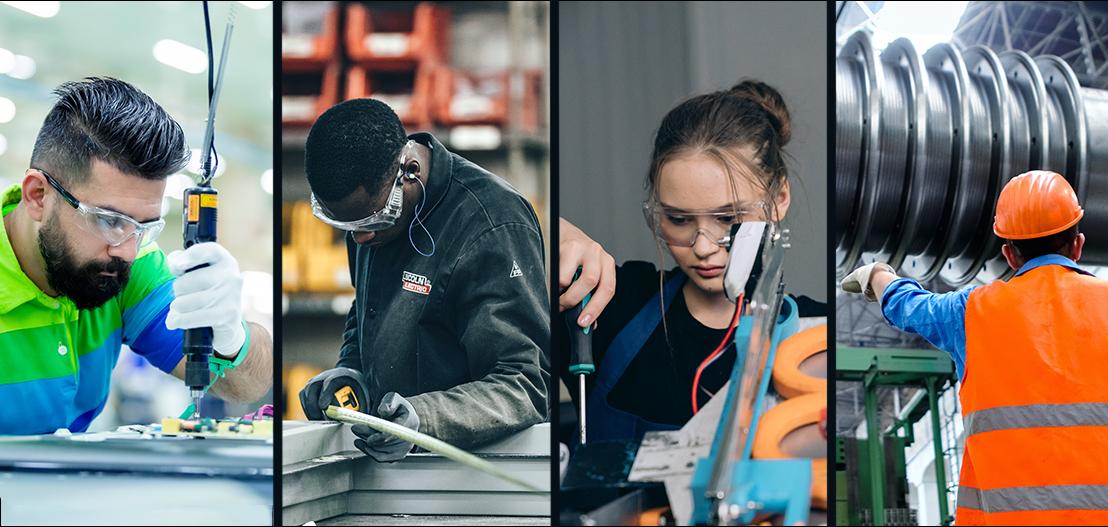Industrial Machinery/Components can be a rewarding career path with stable job prospects and opportunities for growth. If you have a passion for technology and problem-solving, this field offers a chance to work with advanced equipment and manufacturing processes.
Is industrial machinery/components a good career path? Skilled professionals in this industry are in demand across various sectors, including manufacturing, construction, and logistics. With the continuous evolution of technology, there is a constant need for individuals with expertise in industrial machinery and components. A career in this field can provide you with a challenging yet fulfilling work environment where you can contribute to the development of innovative solutions and advancements in industrial automation and engineering.

Credit: phrase.com
Exploring Industrial Machinery/components Career
What Is Industrial Machinery/components Industry?
The Industrial Machinery/Components industry involves the manufacturing, installation, and maintenance of machinery used in various sectors.
Significance Of Industrial Machinery/components Professionals
Industrial Machinery/Components professionals play a crucial role in ensuring the efficient operation and productivity of manufacturing processes.
Benefits Of Pursuing A Career In Industrial Machinery/components
Are you considering a career in industrial machinery/components? Pursuing a career in this field offers a wide range of benefits that make it an attractive choice for individuals with a passion for innovation and problem-solving. In this article, we’ll explore the various advantages of choosing a career path in industrial machinery/components.
High Demand For Skilled Professionals
With the rapid advancement of technology and the continuous growth of industries worldwide, there is a consistent demand for skilled professionals in the field of industrial machinery/components. Companies are constantly seeking individuals who possess the expertise to design, manufacture, and maintain machinery and components to ensure smooth and efficient operations.
Diverse Job Opportunities In Different Sectors
One of the compelling benefits of pursuing a career in industrial machinery/components is the diverse range of job opportunities available across various sectors. Whether it’s automotive, aerospace, energy, or manufacturing, the need for professionals with expertise in industrial machinery and components is pervasive. This diversity allows individuals to explore different industries and find roles that align with their interests and skills.
Skills Required For Success In Industrial Machinery/components
Working in the industrial machinery/components field requires a specific set of skills that are essential for success. From technical proficiency to problem-solving abilities, professionals in this industry need to possess a diverse skillset to excel in their careers. In this blog post, we will explore the core skills required for a fruitful career in the industrial machinery/components sector.
Technical Proficiency
Technical proficiency is the foundation of a successful career in the industrial machinery/components field. Professionals must possess a deep understanding of the technical aspects associated with machinery and components. This includes:
- Knowledge of different types of machinery and their functionalities
- Familiarity with manufacturing processes and equipment
- Proficiency in reading and interpreting technical drawings and specifications
- Ability to operate and maintain complex machinery
Having a strong technical foundation allows professionals to carry out their responsibilities with precision and efficiency. It ensures that they can troubleshoot issues effectively and contribute to the smooth functioning and optimization of machinery.
Problem-solving Abilities
In the industrial machinery/components industry, problem-solving abilities are crucial for overcoming challenges and achieving optimal results. Professionals with strong problem-solving skills possess the following qualities:
- Analytical thinking: The ability to analyze complex situations and identify the root cause of problems.
- Creativity: The capacity to think outside the box and propose innovative solutions.
- Attention to detail: A keen eye for detail helps in spotting potential issues and addressing them promptly.
- Effective communication: The skill to communicate with colleagues and stakeholders to gather information and collaborate on problem-solving.
- Resourcefulness: The ability to leverage available resources to find suitable solutions
Professionals who possess these problem-solving abilities can contribute significantly to minimizing machine downtime, improving productivity, and reducing costs within an industrial setting. They can quickly identify and rectify issues to keep operations running smoothly.
Educational Paths And Training Programs
When it comes to pursuing a career in industrial machinery/components, it’s essential to consider the various educational paths and training programs available. Whether you prefer to earn a relevant degree or certification, or opt for apprenticeships and on-the-job training, each option offers valuable skills and knowledge that can contribute to a successful career. Let’s explore the different paths you can take to enter this field:
Relevant Degrees And Certifications
If you’re looking to pursue a formal education, there are several relevant degrees and certifications that can equip you with the necessary expertise.
Bachelor’s Degree in Mechanical Engineering: This degree offers an in-depth understanding of mechanical systems and their applications in industrial machinery. It covers subjects such as thermodynamics, materials science, and machine design to provide a strong foundation for a career in this field.
Associate’s Degree in Industrial Technology: This degree program focuses on providing practical skills and knowledge required for working with industrial machinery. It covers topics like industrial controls, machinery maintenance, and manufacturing processes. With an associate’s degree, you can enter the workforce or continue your education further.
Certifications: Obtaining industry certifications can demonstrate your competence and enhance your job prospects. Certifications such as Certified Machinery & Equipment Appraiser (CMEA) and Machinery Lubrication Technician indicate your proficiency in specific areas of industrial machinery and can be a valuable addition to your resume.
Apprenticeships And On-the-job Training
If you prefer a hands-on learning approach, apprenticeships and on-the-job training programs can provide valuable practical experience.
Apprenticeships: Apprenticeships allow you to learn from experienced professionals while gaining practical skills. You’ll have the opportunity to work alongside skilled tradespeople, learning the ins and outs of industrial machinery and components. It’s a great way to acquire hands-on experience and develop a comprehensive understanding of the field.
Job Growth And Salary Potential In The Industry
The industrial machinery/components industry offers promising job growth and salary potential. With the increasing demand for manufacturing and production, this career path provides opportunities for career advancement and competitive wages. As technology continues to evolve, professionals in this field can expect a steady demand for their expertise and skills.
Projected Growth Of Industrial Machinery/components Sector
The industrial machinery/components sector is experiencing strong projected growth, making it an attractive career path for those seeking stability and opportunities for advancement. As technology continues to advance, the demand for industrial machinery and components is expected to rise, driving job growth in this industry.
According to Market Research Future, the global industrial machinery market is projected to grow at a CAGR of 5.2% from 2020 to 2027. This significant growth is fueled by factors such as increasing industrialization, automation, and the continuous need for upgrading machinery and components in various sectors such as manufacturing, construction, and energy.
Competitive Salaries And Benefits
One of the enticing aspects of a career in the industrial machinery/components sector is the potential for competitive salaries and comprehensive benefits packages. As professionals in this field develop their skills and gain experience, their earning potential also increases. The specialized nature of the industry often leads to higher wages compared to other sectors.
To provide some perspective, the Bureau of Labor Statistics reported that as of May 2020, the median annual wage for industrial machinery mechanics was $53,380, which is higher than the median wage of $41,950 for all occupations.
Additionally, experienced professionals and those in supervisory roles can earn even higher salaries. Along with competitive wages, many companies in the industrial machinery/components sector offer attractive benefits packages, including health insurance, retirement plans, and paid time off.
In summary, the industrial machinery/components sector offers a promising career path with projected growth and opportunities for increased earning potential. As technology continues to advance and industries rely more heavily on machinery and components, the demand for skilled professionals in this field will continue to rise.

Credit: wonderlic.com
Challenges Faced By Professionals In The Field
Professionals in the field of industrial machinery/components face various challenges as they navigate their career path. From constantly evolving technology to increased competition, they must adapt to new trends and acquire specialized knowledge to succeed in this dynamic field. However, these challenges also present opportunities for growth and innovation, making it a promising career path for those who are willing to embrace the changes.
Challenges Faced by Professionals in the Field
Automation and Technological Advancements
In the fast-paced world of industrial machinery and components, professionals face the ever-present challenge of keeping up with automation and technological advancements. This demands continuous learning and upskilling to stay competitive and relevant in the industry.
Safety and Regulatory Compliance
Another significant challenge for professionals in the field of industrial machinery/components is ensuring safety and regulatory compliance. The nature of the work often involves operating heavy-duty equipment in potentially hazardous environments, making it crucial to adhere to strict safety protocols and regulations.
Many professionals
The practical application of safety measures and compliance with regulations is paramount to prevent workplace accidents and maintain a secure working environment. This often requires significant attention to detail and an unwavering commitment to following established safety standards.
Given the rapid advancements in technology and the stringent regulatory landscape, staying abreast of these challenges is vital for professionals in the industrial machinery/components sector.
Success Stories Of Individuals In Industrial Machinery/components
Profiles Of Leading Industry Professionals
John Smith: With over 20 years of experience, John is a renowned leader in industrial machinery design and innovation.
Lisa Chang: Starting as an apprentice, Lisa worked her way up to become a respected industrial components engineer.
Journey From Novice To Expert
- Hands-On Experience: Many professionals start by learning the basics through hands-on training.
- Ongoing Learning: Continuous education and skill development are key to advancing in this field.
- Mentorship: Guidance from experienced professionals can greatly accelerate one’s journey to expertise.
“`
Success Stories of Individuals in Industrial Machinery/Components
Profiles of Leading Industry Professionals
– John Smith: With over 20 years of experience, John is a renowned leader in industrial machinery design and innovation.
– Lisa Chang: Starting as an apprentice, Lisa worked her way up to become a respected industrial components engineer.
Journey from Novice to Expert
– Hands-On Experience: Many professionals start by learning the basics through hands-on training.
– Ongoing Learning: Continuous education and skill development are key to advancing in this field.
– Mentorship: Guidance from experienced professionals can greatly accelerate one’s journey to expertise.

Credit: www.simplilearn.com
Tips For Aspiring Industrial Machinery/components Professionals
Industrial machinery/components professionals can find a promising career path with endless possibilities. With the right tips and guidance, aspiring individuals can excel in this field and enjoy a fulfilling and rewarding journey.
Networking And Continuous Learning
If you’re an aspiring industrial machinery/components professional, there are several tips that can help you kickstart your career and set yourself up for success. One of the most important tips is to focus on networking and continuous learning.
By building strong connections within the industry and staying updated on the latest advancements, you can enhance your career prospects and stay ahead of the curve. Let’s explore how networking and continuous learning can contribute to your success in the field of industrial machinery/components.
Building A Strong Portfolio And Skillset
Another crucial tip for aspiring industrial machinery/components professionals is to focus on building a strong portfolio and skillset. Employers and clients often look for candidates who have a diverse range of skills and practical experience. By showcasing your expertise through a well-rounded portfolio and continuously honing your skills, you can position yourself as a valuable asset in this competitive field. Now, let’s dive deeper into how you can build a strong portfolio and skillset.
Networking
Networking is an essential aspect of any career, especially in the industrial machinery/components industry. By connecting with industry professionals, you can gain valuable insights, access job opportunities, and build relationships that may lead to future collaborations. Whether it’s attending industry events, joining professional associations, or leveraging online platforms, make an effort to expand your network. Who knows, your next big career opportunity might come from a simple conversation at a networking event.
Continuous Learning
In a rapidly evolving industry like industrial machinery/components, it’s crucial to embrace continuous learning. Technology advancements and industry trends can greatly impact the skills required for success. Stay updated on the latest developments by attending workshops, taking courses, or even pursuing further education in specialized areas. By demonstrating your dedication to continuous learning, you’ll show employers that you are adaptable and capable of staying ahead in an ever-changing industry.
Building A Strong Portfolio
To stand out in the industrial machinery/components field, you need to have a strong portfolio that showcases your expertise and achievements. Include samples of your work, highlight client or employer testimonials, and detail the projects you have successfully completed.
You can also consider creating a personal website or online portfolio to make it easy for potential employers or clients to review your work. A visually appealing and well-organized portfolio can make a significant impact when it comes to landing job interviews or securing contracts.
Building A Strong Skillset
Having a diverse range of skills is essential for success in the industrial machinery/components industry. Identify the specific areas you want to specialize in and make a conscious effort to develop those skills. If you’re unsure which skills are in high demand, research industry trends and talk to professionals already working in the field. Additionally, consider obtaining relevant certifications or attending training programs to enhance your skillset. The more well-rounded and adaptable your skillset is, the better equipped you’ll be to excel in this industry.
Conclusion
To excel in the field of industrial machinery/components, aspiring professionals need to leverage networking opportunities, embrace continuous learning, and invest time and effort into building a strong portfolio and skillset. By following these tips, you’ll be on your way to establishing a successful and fulfilling career in this dynamic industry. Keep your connections strong, stay curious, and never stop growing your skills and knowledge.
Frequently Asked Questions Of Is Industrial Machinery/components A Good Career Path
What Career Opportunities Exist In Industrial Machinery/components?
For career seekers, the industrial machinery/components sector offers diverse job roles such as mechanical engineer, production manager, quality control specialist, and maintenance technician. This field provides a wide array of opportunities for those with technical expertise and a passion for problem-solving.
What Skills Are Essential For A Successful Career In This Field?
Proficiency in technical skills, problem-solving abilities, attention to detail, and strong communication skills are crucial for a successful career in industrial machinery/components. Adaptability to new technologies and a strong understanding of industry regulations are also highly valued in this competitive field.
Is The Industrial Machinery/components Industry Growing And In Demand?
Yes, the industrial machinery/components industry is experiencing sustained growth and high demand due to advancements in automation, digitization, and the increasing need for innovative solutions in manufacturing and production processes. This trend creates promising prospects for professionals aspiring to pursue a career in this field.
What Are The Education And Qualification Requirements For This Career Path?
A bachelor’s degree in engineering, manufacturing, or a related field is generally required for entry-level positions in the industrial machinery/components industry. Additionally, specialized certifications and hands-on experience with relevant technologies and equipment can significantly enhance job prospects and career advancement.
Conclusion
In the rapidly evolving industrial machinery and components industry, there are promising career opportunities for those with the right skills and passion. As technology continues to advance, the demand for skilled professionals in this sector is expected to grow. With the potential for high job satisfaction and financial reward, pursuing a career in industrial machinery and components can be a solid choice for the future.